Every language has its own share of unique idioms and expressions, and learning these would give us insights into the thoughts and culture of its native speakers.
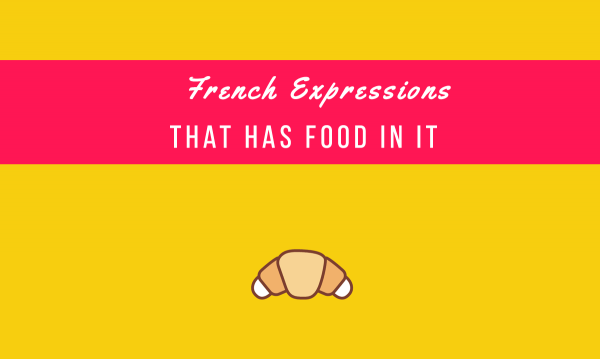
The French, for example, has a long list of funny and absurd expressions which gives you a glimpse of their creative, deadpan humor. The French language also has a seemingly endless list of idioms about animals such as cats, dogs, and goats, among others.
But another common theme in French expressions is food. Being a country that is utterly in love with good food, fresh ingredients, and tasty desserts, you’ll notice that different kinds of edible delights have made their way into French idiomatic use.
Today, we’ll be learning about 25 French expressions that are all about F-O-O-D.
Let’s start the ball rolling for French food phrases with two expressions about cheese.
Expressions about Cheese
1. En faire tout un fromage

Literal meaning: to make a whole cheese about it
What it really means: to make a big deal of something
If you make a giant fuss about something, the French would say, en faire tout un fromage, or you’re making a whole cheese about it. English speakers would say you’re making a mountain out of a molehill, but it’s not nearly as tasty as the French version, don’t you think?
Here’s another cheese-related expression:
2. triste comme un repas sans fromage
Literal meaning: sad like a meal without cheese
What it really means: to be very sad
A meal without cheese...what a lonely sight. If you’re as passionate about cheeses as the French, a cheese-less meal is not only incomplete, it’s also super sad. 🙁
For a quick background of French eating habits, check out this article.
For a list of some of the most popular French cheeses, go here.
Expressions about Bread
Bread is another common part of a French meal. So after cheese, let’s take a look at expressions about bread.
3. avoir du pain sur la planche
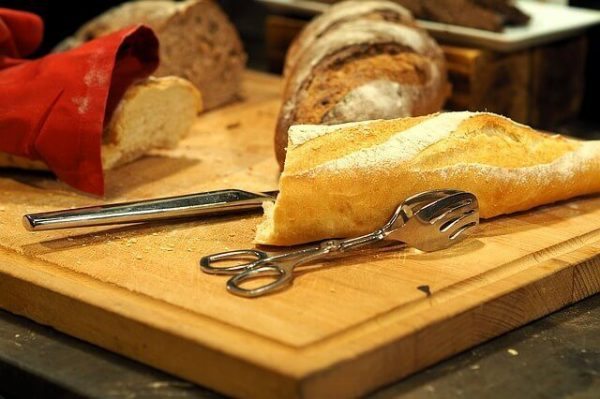
What it means literally: to have bread on the board
What it actually means: to have many things to do
While English speakers would say “to have one’s work cut out (for him)”, the French equivalent of the expression just has to make use of bread.
Get 365 French idiomatic expressions here in the French Vocabulary Mastery Course!
Still Stuck at Intermediate French?

Break through the plateau with our proven coaching and study method.
4. Pour une bouchée de pain
What it means literally: for a mouthful of bread
Its real meaning: for a pittance; for a small amount/cheaply
When you buy something for an amount so insignificant that it doesn’t make any dent in your wallet the French would say you bought it for a mouthful of bread. Another similar expression is “pour un morceau de pain” which means ‘for a piece of bread’. It basically means the same thing: not expensive.
Still Stuck at Intermediate French?

Break through the plateau with our proven coaching and study method.
Expressions about entrées
We’ve talked about bread and cheese. How about some starter dishes or entrées?
5. Cracher dans la soupe

Literal meaning: to spit on the soup
What it really means: to be ungrateful
When someone offers you a steaming bowl of soup, what would you do? Would you spit on it? Oh hell no. To the French, doing that is tantamount to being an ingrate. Such a waste of good soup, too. In English, there is a similar expression, albeit with no specific food mentioned. That is, ‘to bite the hand that feeds you’.
6. Être soupe au lait
Literal meaning: to be milk soup
What it really means: to be ill-tempered; to have a short fuse
It might seem weird to liken someone who erupts in anger easily into milk soup. I mean, milk soup? Really? But if you look into the etymology of this expression, you will also be given an insight into how the French people’s mind works, and how they link ideas to things they like to do… such as cooking.
You see, cooking soup with milk can be very delicate. It boils easily and tends to overflow when unattended. Same with someone with a short fuse: easy to erupt, boils over immediately. Just like milk soup indeed!
7. Mettre du beurre dans les épinards

Literal meaning: to put butter in the spinach
What it really means: to improve one’s financial situation; to earn a little bit more
While it’s difficult to pinpoint exactly how this expression came to be, one could only put two and two together and realize that spinach on its own can be quite bland. But with enough money to buy butter, it can be made to taste so much better. Interesting, no?
8. Une quiche

Literal meaning: A quiche (a savoury, unsweetened pie-like dish usually filled with cheese, veggies, meat, or seafood)
What it means: Someone who is bad at doing something
Sure, a quiche is delicious; truly un délice.... But when someone French calls you a quiche, don’t take it as a compliment. He or she mean to say that you’re not too competent at something. For example, when a French person says you are “être une quiche en informatique”, it means that you’re somewhat stupid with a computer. Or in internet slang, a n00b.
Be careful with any confusion though because in some American English youngsters’ lingo, the term quiche is now used to refer to someone who is super hot---like, hotter than hot.
9. raconter des salades
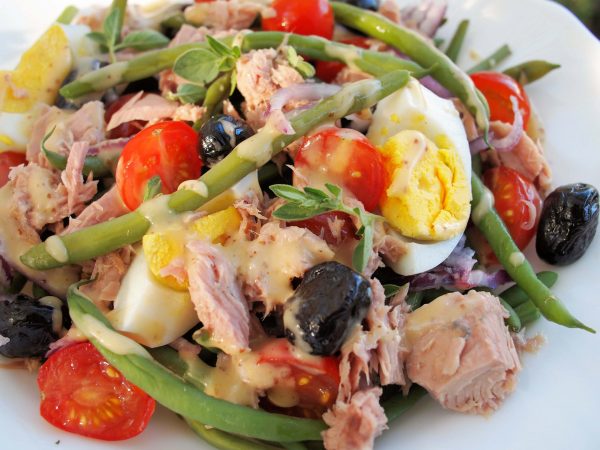
Literal meaning: to tell salads
What it really means: to tell lies; to tell tall tales; to make up stories
There are a lot of similar expressions to this in English: spinning yarns, telling tall tales, or making up stories. None of those, however, are as delicious as its French counterpart.
To tell salads is so much more than just simple telling of lies. It’s telling a tale as embellished as making a salad. Let’s compare it to making a Salad Nicoise for example.
You start with a solid base of story like laying out some cooked potatoes in a platter. Add some little colorful lies here and there like you’re mixing in greens, eggs, tuna, tomatoes, cucumber, and eggs. Lastly, drizzle some vinaigrette all over, to complete your believably delicious platter of lies...er, salad.
Pretty sure if you dress up your lies as creatively as that, anyone would gladly eat it up. It’s not just a tall tale, it’s a liar’s masterpiece!
Expressions about veggies and fruits
One of the major factors that make French cuisine stand out is its use of hand-picked fresh ingredients. France is blessed with a terrain and climate that is perfect for growing all kinds of the freshest produce. Naturally, these ingredients would make their way into expressions as well.

10. Occupe-toi de tes oignons/ Mêle-toi de tes oignons
Literal meaning: mind your own onions
What it means: mind your own business
This expression can be somewhat offensive but it’s a popular one. When someone pokes their nose into your own affairs, you can tell them to mind their own onions and stay away from yours. Another usage of this expression is to say, “ce ne sont pas vos (or tes) oignons”. It means “it’s none of your business” or literally, “these are not your onions”.
11. rouge comme une tomate
Literal meaning: red as a tomato
What it really means: to be embarrassed
This is one of the easy ones. When someone blushes so furiously that his face turns as red as a ripe and juicy tomato, you bet he or she is in the throes of embarrassment.
12. haut comme trois pommes
Literal meaning: tall as three apples
What it means: to be quite short
Can you imagine a person being as short as three apples? This is a hyperbole, of course, but if someone says you’re about as high as three apples, for sure you are quite lacking in the height department.
13. être dans les choux
Literal meaning: to be in the cabbage
What it means: to be in a bad situation; in a mess
When a French person tells you he is in the cabbage, it means things are not going so well for him and he’s in a rather screwed up situation. But why? What’s the connection between a cabbage and a mess? This idiom is attributed to a play on words between chou and échouer. The verb échouer which means ‘to fail’ sounds like chou (cabbage).
14. Couper la poire en deux
Literal meaning: to cut the pear in half
What it means: to split the bill; to reach a compromise
So there’s a pear and you both want it. What’s the best way to handle the situation that will be win-win for both of you? Simple. You cut it in half of course! This is the essence of this no-nonsense expression. You can see this being used in the context of dividing the cost or meeting someone halfway.
15. Les carottes sont cuites
Literal meaning: the carrots are cooked
What it means: there’s nothing to be done anymore; it’s too late
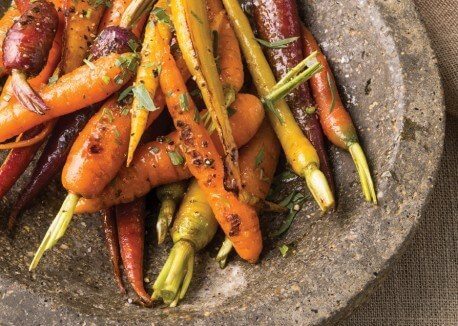
When making a stew, the carrots are said to be the last vegetables to be cooked. So when the carrots are already cooked, it’s game over, no more additional action can be done. This is a somewhat old-fashioned expression but still useful to learn. The English speakers would say, “the jig is up”, “the train has left the station”, “the chips are down”, or even another food expression “the goose is cooked”.
16. avoir la pêche
Literal meaning: to have the peach
What it means: to be enthusiastic; to be full of energy
When a French person says he has the peach, it means he is in high spirits. But why the peach? What is it about this fruit that makes it evoke happy thoughts and positive emotions? One source says that peach in French ( la pêche) is also a synonym for “punch”. So when someone has the peach, he packs a punch and has a lot of energy. Makes sense?
In North American slang, to say something is peachy means it’s doing great or it’s quite fine; same with the other sillier version “peachy-keen”.
17. ramener sa fraise
Literal meaning: to bring your strawberry
What it means: to join a conversation uninvited; to intervene in a conversation without being asked
When someone brings his strawberry into a conversation, it means that he is butting into the discussion. Sort of like sticking in his two cents where it’s not wanted.
Except perhaps, when instead of plain strawberries, that person brings Le fraisier instead. Pretty sure he would be welcome to stick his nose into any conversation anytime.
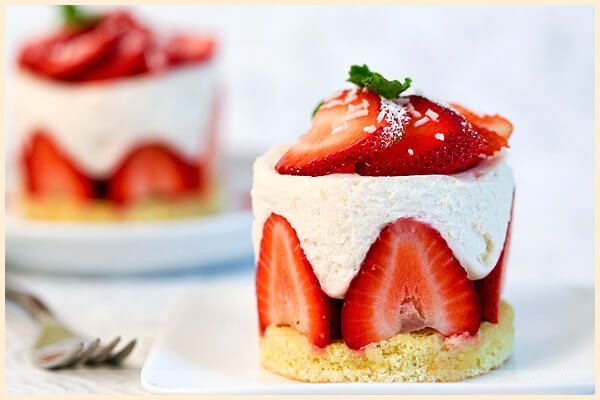
18. c’est la fin des haricots
Literal meaning: it’s the end of the beans
What it really means: there’s nothing left; the end of the line
Beans are considered a simple fare; a sort of go-to last resort. So when someone says that it’s the end of the beans, it’s like saying, we’re doomed! We’re totally screwed! Sounds depressing, right? But actually, this expression is used with a hint of irony to make light of a rather serious situation.
19. avoir le melon
Literal meaning: to have the melon
What it really means: to be quite sure of oneself; to be cocky
While having the peach means being full of energy, having the melon is another story… It means you’re an overconfident, cocky chap. But who gets to make these decisions anyway---that peach=energy and melon=self-confidence? Nobody knows for sure. But just roll with it, okay.
Other Expressions about Food and Beverages
So there you go with the different fruits and vegetables. For the last part of this list, we’ll be talking about other types of ingredients, food, and beverage not mentioned above.
20. Mettre de l’eau dans son vin
Literal meaning: to put water on the wine
What it really means: to tone it down
For example, you’re in an argument with someone equally as stubborn as you and neither of you seem to be yielding to each other’s opinions. But after a while, you decide to give in a little and moderate your stand on the issue. The French would say you have watered down your wine. It’s not necessarily a bad thing figuratively...But literally? What utter waste of good wine!
21. casser du sucre sur le dos de quelqu’un
Literal meaning: to break sugar on someone’s back
What it really means: to bad-mouth someone; to say ill about someone in his absence
One would think that sugar and gossiping are two very far-off things. In this expression, however, you’ll find the two paired off.
But what does breaking sugar have to do with speaking ill of someone behind his back? Honestly, the etymology is buried deep in history that no one can seem to tell the reasons straight..
22. Être beurré
Literal meaning: to be buttered
What it really means: to be completely drunk
This is way different from and must never be confused with the English term “to be buttered up”. Buttering up someone in English means to cozy up to him and treat that person nicely in the hopes of getting something in return. The French version is more straightforward (and more fun). It simply means to be super drunk. That’s it.
Still Stuck at Intermediate French?

Break through the plateau with our proven coaching and study method.
23. La moutarde me monte au nez
Literal meaning: to have mustard coming up the nose
What it really means: to be annoyed/ angry; to see red
The image it paints may be somewhat weird and a little---okay, a lot---disgusting. But it’s just a creative way of saying someone is getting upset over something. You certainly would start seeing red too, if mustard, especially the real Dijon kind, gets up into your nose.
Still Stuck at Intermediate French?

Break through the plateau with our proven coaching and study method.
24. Va te faire cuire un œuf
Literal meaning: go cook an egg
What it really means: get lost
While the English speakers would say “go to hell” which is a bit harsh, the less offensive “get lost”, or even the sort of funny “go fly a kite”, the French would advise you to bugger off and do something productive instead. Like cook an egg for yourself.
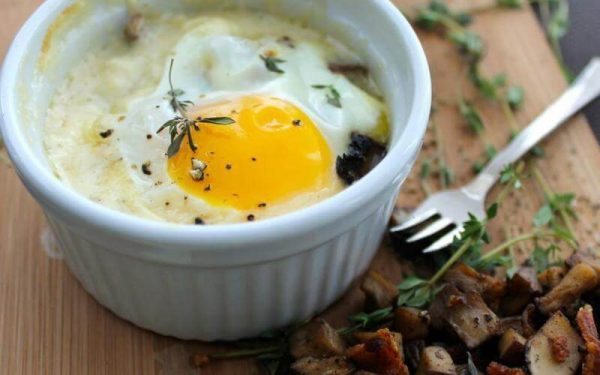
So the next time a French person tells you to go cook an egg, why not try making Oeufs en Cocotte? Here’s a good recipe.
25. avoir le cul bordé de nouilles
Literal meaning: to have an ass full of (or surrounded by) noodles
What it really means: to be lucky
When someone has noodles in the backside, it means he’s quite a lucky fellow. Wait---what?! A bit absurd, I know. Nobody really knows for sure how this expression came to be.
...And there you have it, 25 different French expressions related to food. Which one is your favorite? Do you know other food expressions that should have made it to this list? Make sure to add in the comments section.
For a list of weekly expressions and vocabulary, plus lots of freebies, subscribe to the Talk in French newsletter by clicking the photo below.
Still Stuck at Intermediate French?

Break through the plateau with our proven coaching and study method.

You want to change your “French Expressions that HAS food in it” to “French expressions that HAVE food in THEM”. Like the post!